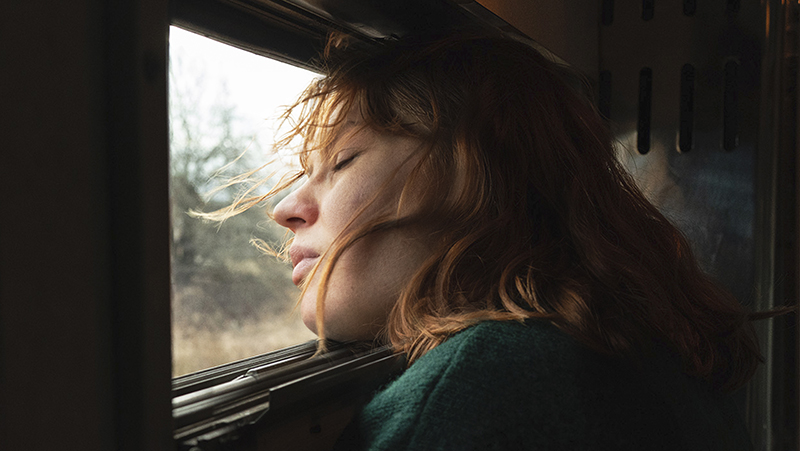Visions of Europe: Compartment No. 6 LUMI Review
06 April 2022
LUMI programmer Fionntán Macdonald reviews Compartment No. 6, screening as part of the Visions of Europe season.

Intimate, unhurried and unsentimental, Finnish auteur Juho Kuosmanen's Compartment No.6 (2021) is a slow speed locomotive that takes you on an introspective journey. Focused on two characters who meet by chance on a train journey, there is little in the way of plot to keep this film on the tracks, but a lot of abstract emotion and a pair of charming performances make it worthwhile.
Opening, somewhat deceptively, to Love is the Drug by Roxy Music over bold block colour titles, we meet Laura, played by Seidi Haarla. Swiftly transitioning to a muted colour palette as we meet her, Laura is immediately sympathetic in the subtle alienation that she feels from those around her. Opening as she enters a bohemian salon with marijuana smoking intellectuals playing a literary guessing game, our protagonist doesn’t quite seem to fit. She sinks into herself, swallowed up by the dark garment that swathes her in a subtle but clever piece of costume design, and is treated disdainfully by most of the people she encounters.
Established early as a foreigner in the film’s Russian setting, there’s a sense of her ‘otherness’ and millennial inferiority complex that pervades the film’s opening moments. Filmed primarily with a handheld camera, we follow the action with a floating eye and loose framing that speaks to the character’s uncertain position in her life and harkens to Dogme 95, itself a bare-bones movement in European cinema.
Yuriy Borisov’s supporting character of Lyokha is initially established as another force of alienation for her as, while outwardly friendly, he boorishly overbears on her quiet indifference in a drunken attempt to establish a connection. It’s far less of a meet-cute than simply a meeting, made by chance and with a clear expiration once this journey is complete. Borisov’s character, initially vulgar and aggressive, is no romantic lead and while the film’s setting beckons comparison’s to Richard Linklater’s seminal train movie Before Sunrise (1995), the DNA is different.
When asked by Boris if she thinks he is a bad guy Laura simply responds that “I only know what I’ve seen,” and this statement holds true for the audience as well. We have a limited understanding of these characters, only a meagre drip feed of information that illuminates little of their history, and knowing so little about them we too are forced to judge them based only on the merits of their actions.
Notably, Harlaa’s character is in search of history throughout this film when her own remains unseen. Journeying to Murmansk to view petroglyphs, archaeological artefacts depicting ancient art, she seems determined to find something in the past: perhaps because she feels the present slipping away. One of the few significant props in this minimalist work is Laura’s video camera, which contains the only record of her time in Moscow with her increasingly estranged partner. When this is lost on her journey she is devastated.
Later calling her lover from a payphone, Laura notes that the woman is never alone and, while often surrounded by people, Laura herself exudes introversion and seems to exist in emotional solitude. With such minimalism at play, each element resonates and harkens back to this central theme, even down to the aforementioned titles: a sign of the vibrancy within these people beneath the monotony. In one key moment this wallflower seems to breach the ground as she drinks with an old friend of Lyokha’s, toasting to her “inner animal”, a sign that for all the repressed Eastern Block stoicism there are depths to these people beneath the icy surface.
This film explores kinship in solitude, the sad reality that no matter how many people are around us we can still be completely alone, and how it is that when we are most in need of companionship we push people away. These characters are orbiting each other emotionally, moving towards a moment of catharsis before pushing back and self-sabotaging, perhaps unwilling to admit that they need each other in this moment. They are like magnets in a way, inextricably attracted to each other but unable to meet due to their polarity; opposite poles attract each other while similar poles will always repel.
Meeting fatefully at a junction, these two characters feel entirely authentic and more empathetic for their faults. Pure entertainment this is not, but it certainly has something to offer for anyone interested in European cinema and plays out as a charming character duet with a quiet grace and a slow burning charm.
- written by LUMI programmer Fionntán Macdonald




